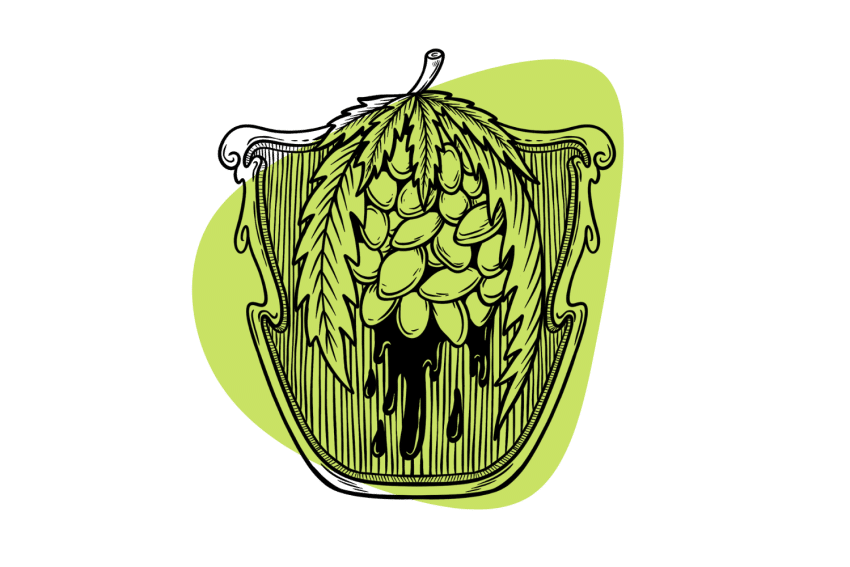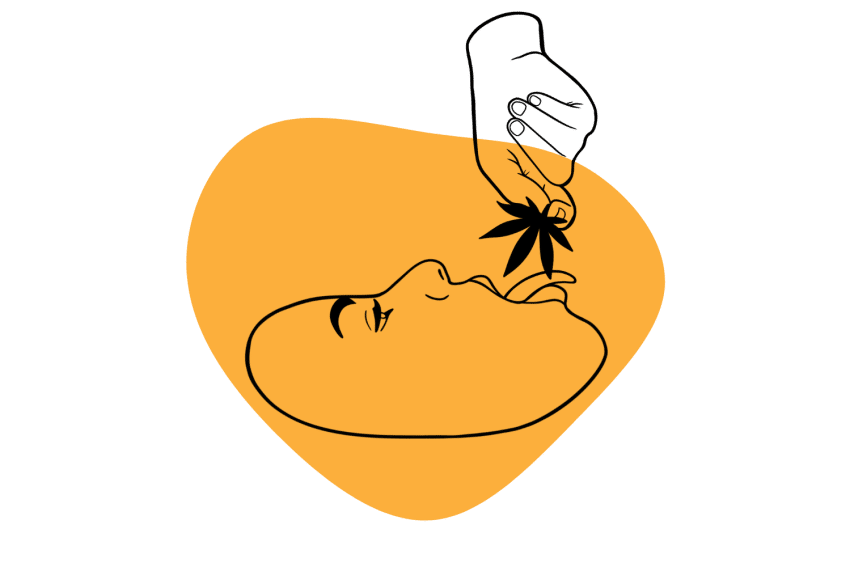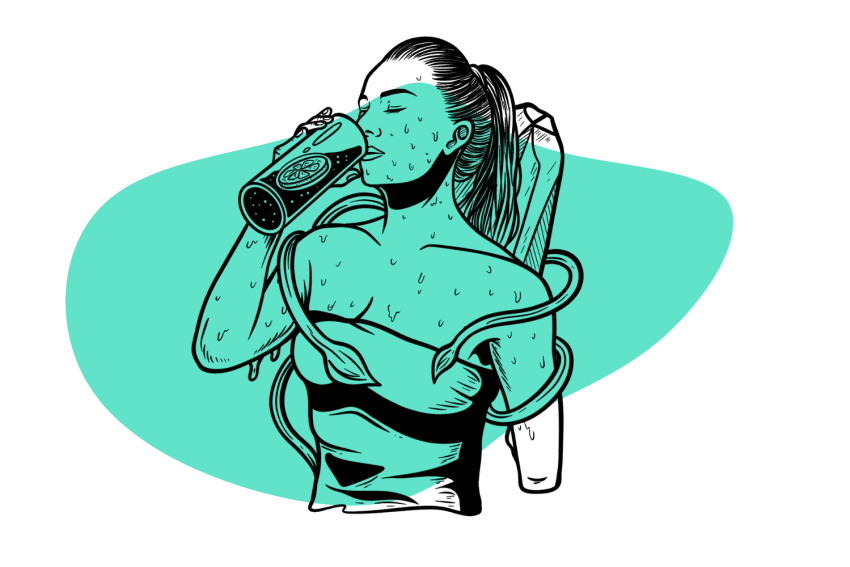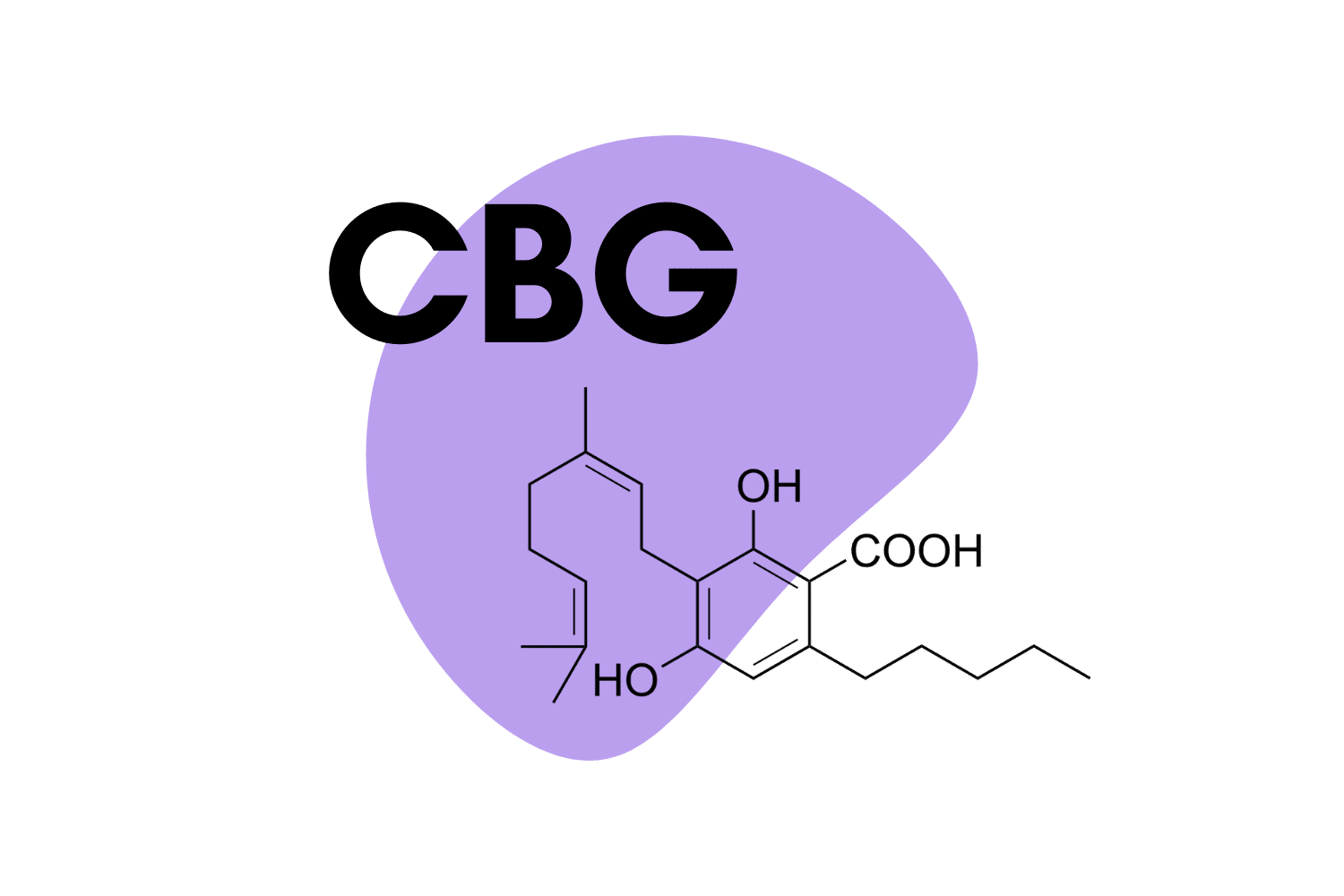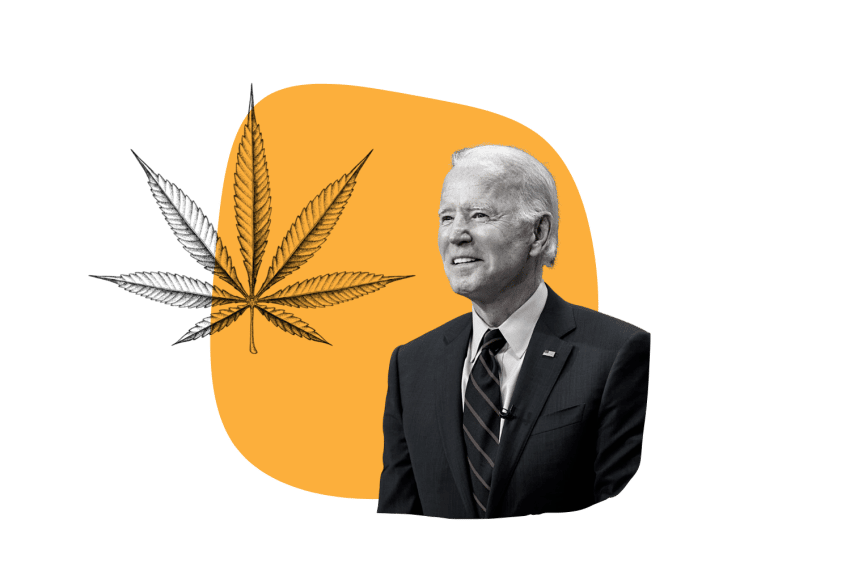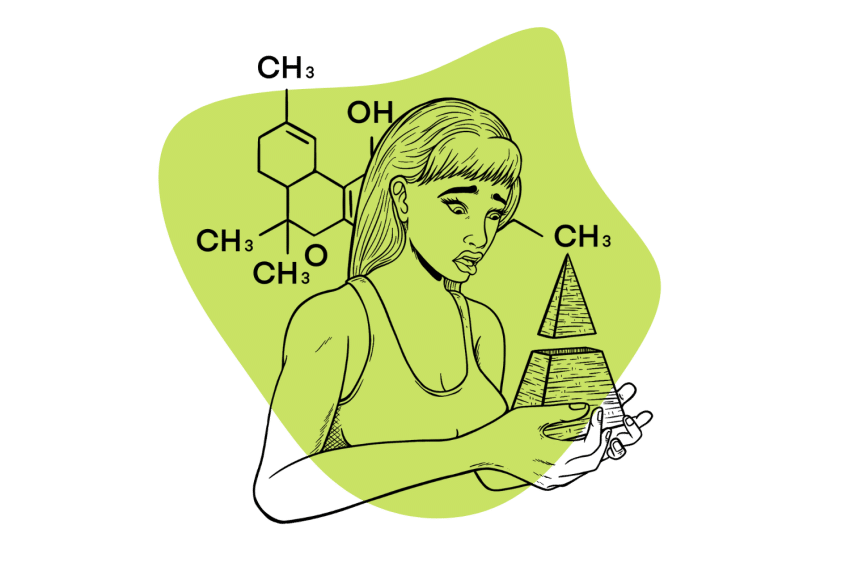Delta-8 vs. Delta-9 THC: Pharmacology, Legality, & Comparison
Delta-8 THC was the first product hemp manufacturers produced to exploit legislative loopholes to bring THC to restrictive states — but how does it differ from delta-9?
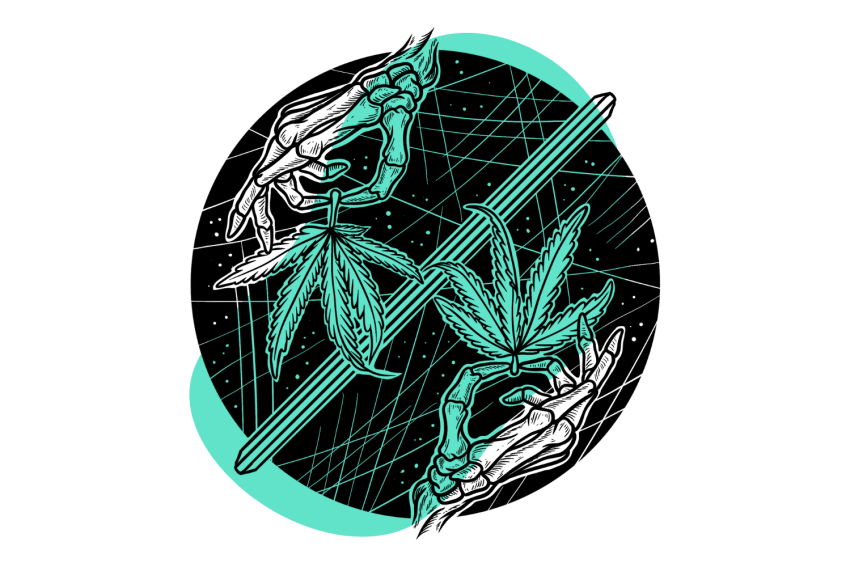
Delta-8 tetrahydrocannabinol (THC) tends to get a bad rep in states with legal access to marijuana, mostly due to the unregulated market and extensive process to produce it.
For consumers in restrictive states, however, delta-8 was a game-changer, providing a legal form of THC to the masses.
While delta-8 doesn’t have as strong of an effect as delta-9 THC, this can be a selling point for people sensitive to the high — plus, it may have a benefit or two of its own. With other potential legislative loopholes bringing delta-9 THC products to hemp shops, customers around the country can now choose between the two, regardless of where the law stands.
Here’s a quick rundown of everything we’ll discuss below:
- Quick Comparison
- How THC works
- Effect profile differences
- Legal differences
- Side effects & risk
- Where to buy D8 & D9
- FAQs
The complex and controversial legal distinction between hemp and marijuana brought us legal cannabis products long before governments had a chance to legalize it, but it also created several areas of concern we simply can’t ignore.
Here’s what you should know before you buy:
Related Guides: Cannabis 101 | Delta-8 THC 101 | Delta-9 THC 101 | HHC vs. THC
Quick Comparison: D8 vs. D9
Delta-8 THC is a remarkably similar molecule to its federally illegal cousin, Delta-9. The only difference in their structure is the location of a double-bonded carbon — occurring on either the 8th or 9th point of the molecule, respectively.
This makes delta-8 an “isomer” of delta-9 THC, meaning it contains the same components in a slightly different arrangement. This slight difference is what gives it a slightly lower affinity for the receptors than delta-9 THC, translating to a decrease in relative potency.
Comparative studies in the early 70s found it to have a nearly identical effect with roughly ⅔ (66%) of the “high” from delta-9 [1]. Newer research seems to confirm this finding, though they were incorrect on one thing in the conclusion:
“For several reasons,” the authors hypothesize, “it seems unlikely that any purified or synthetic cannabis-like material will supplant cannabis as a socially used drug.” While delta-8 certainly hasn’t taken over the role of cannabis throughout the country, restrictive states have seen a surge of interest in delta-8 products.
One paper from 2022 even had researchers questioning if the lower potency of delta-8 THC might make it more approachable or broadly beneficial. They titled their paper by questioning if it could be “delta-9-THC’s nicer younger sibling [2].”
Of course, outside of the initial period of its discovery and the recent resurgence of interest, there’s been very little research on this compound. While it seems likely the only difference is a slightly lower potency, we still know very little about delta-8 THC.
The concern surrounding these compounds for delta-10, delta-7, and other new isomers that are hitting the shelves today.
D8 vs. D9 Comparison Chart
| Delta-8 THC | Delta-9 THC | |
| Double Bond Position | 8th position | 9th position |
| Common Dose | 15–30 mg | 5–10 mg |
| Natural or Synthetic? | Naturally occurring, but most commercial products are semi-synthetic | Naturally-occurring |
| Legal Status | Legal federally but illegal in 50% of the USA | Illegal federally but legal in 70% of the USA |
| Common Side Effects | Couch lock, fatigue, dizziness | Anxiety, paranoia, insomnia |
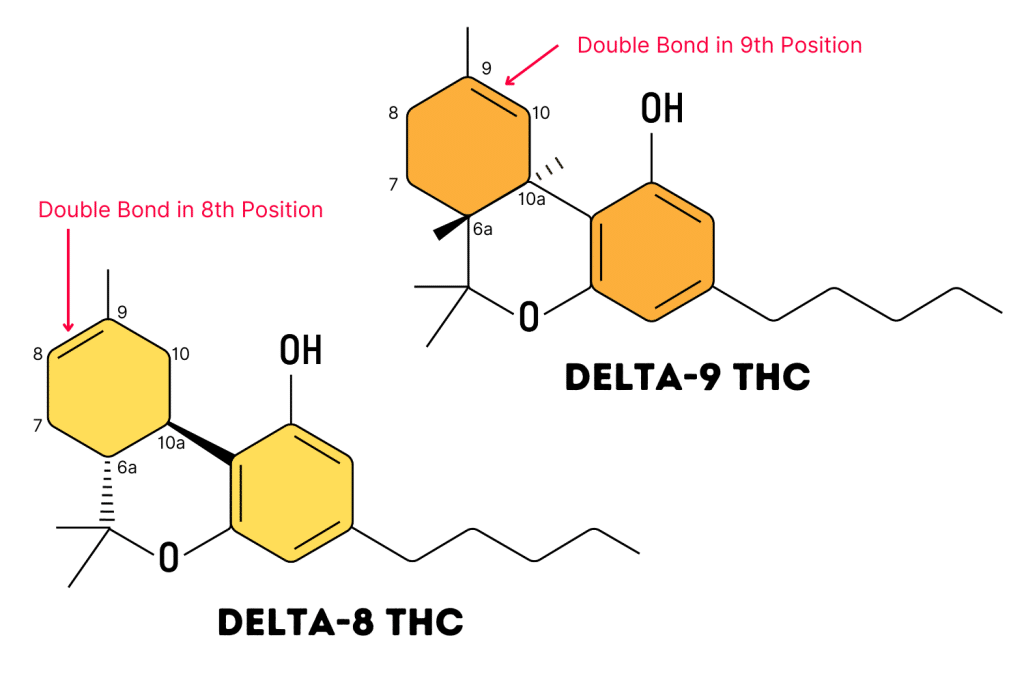
Mechanism of Action (How D8 & D9 Work)
Both forms of THC activate the CB1 and CB2 receptors of the endocannabinoid system [4] — which itself focuses on homeostasis (or balance) within the body and brain. If you think of delta-9 THC as being the perfect “key” to “unlock” the receptors, it makes sense that any minor difference could result in lowering the efficacy.
The CB1 receptors are largely located in the brain and central nervous system (CNS) and are responsible for the “high” weed provides. In contrast, CB2 receptors — CBD’s main target — promote relaxation and pain relief without the “alterations of consciousness.”
Like delta-9 THC, delta-8 converts to a stronger molecule after it’s gone through the metabolic system. With delta-9 THC, our body first converts this to 11-hydroxy (OH) delta-9-THC, and delta-8 undergoes a similar 11-OH addition.
Some studies suggest delta-8 metabolites have a stronger relative potency to their non-digested counterparts than delta-9. This wouldn’t be enough to make delta-8 edibles stronger than the same dosage with delta-9, but it does seem as though the increase in potency from inhale to edible is higher.

Effect Profile Differences: D8 vs. D9
Both molecules seem to have a similar pathway through the body, indicating they exert nearly identical effects. While the relative potency of delta-8 and delta-9 (and the potency of their metabolites) are still up for debate, a dose of delta-8 should feel just like ⅔ of the same dose of delta-9.
One potential difference may be that delta-8 has a slightly stronger effect on CB2 receptors than delta-9 does. While both interact with CB1 and CB2 receptors, delta-8 may have more impact on the latter than delta-9 in doses adjusted for relative potency.
This may lend some credence to the claim that delta-8 provides a more “indica-like” effect and provides more relaxation and sedation than cerebral uplift.
All of these questions still do not have a definitive answer, and we still know far less about delta-8’s pharmacology than delta-9.
Still, even if the only difference is a less intoxicating effect, this can be tremendously beneficial for newcomers or people with THC sensitivities.
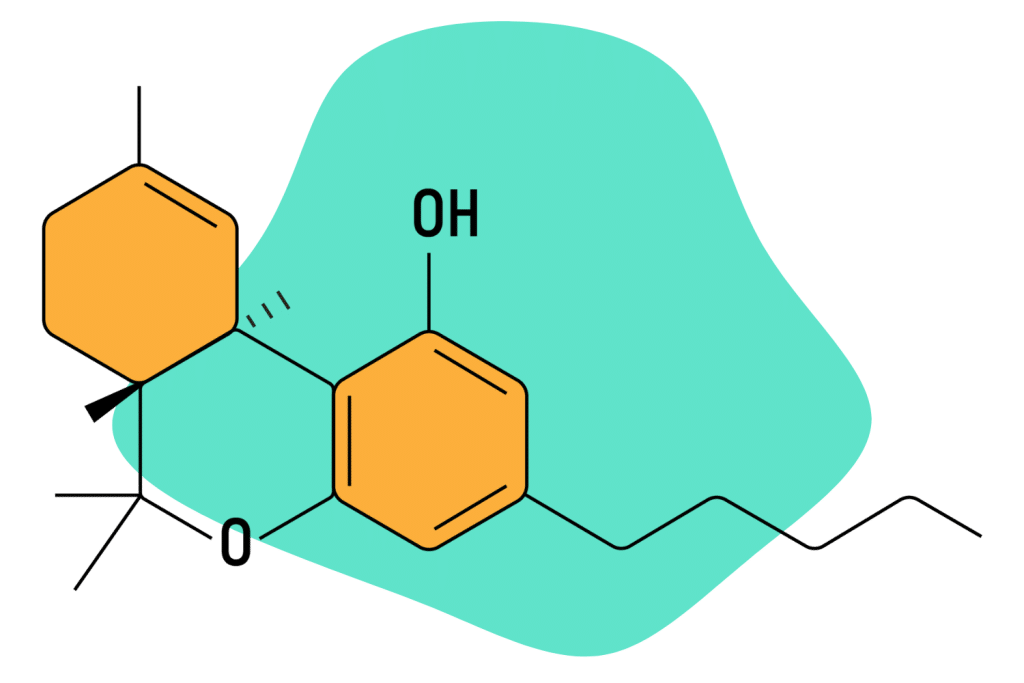
Consumption Methods: D8 vs. D9
Since Delta-8 THC has to go through a synthetic process, truly smokable options do not exist. The smokable flower on the market today is typically delta-8 sprayed onto hemp flower, making it a formidable CBD:THC ratio.
For many, this can create a more pleasant experience, but the smoke will be far harsher with the addition of distillate. For this reason, most consumers of delta-8 opt for a vapable or edible option instead.
Vape cartridges with delta-8 often also typically utilize terpene formulations to mimic strains. Though these terpenes usually come from more abundant natural sources instead of cannabis, this can give them a sweeter and richer flavor profile.
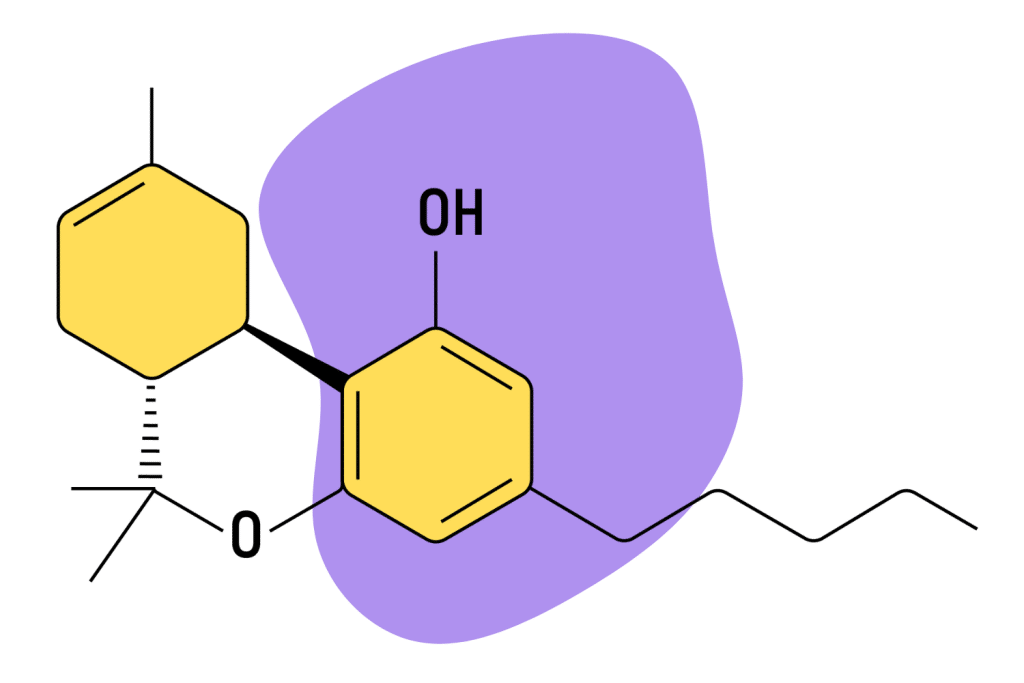
Legal Comparison: Delta-8 vs. Delta-9
Delta-9 THC is legal in several states through adult-use and medical marijuana programs. However, it’s also legal in several states without legal access to marijuana through a similar loophole to delta-8.
Several of the states banning delta-8 THC and similar isomers offer access to marijuana through medical or adult-use programs. Their motives for banning the new cannabinoid in the market was to prevent an unregulated THC market from forming outside the system they had already created for marijuana.
Others reacted to the loophole exploitation by seeking to tighten the grip on prohibition and close out the legal THC alternative.
Here’s how it all breaks down:
States Where Marijuana Is Legal
The following 24 states (plus the District of Columbia and the territory of Guam) have legalized adult-use sales of marijuana:
- Alaska
- Arizona
- California
- Colorado
- Connecticut
- Delaware
- District of Columbia
- Guam
- Illinois
- Maine
- Maryland
- Massachusetts
- Michigan
- Minnesota
- Missouri
- Montana
- Nevada
- New Jersey
- New Mexico
- New York
- Ohio
- Oregon
- Rhode Island
- Vermont
- Virginia
- Washington
Additionally, the following 13 states have pathways for medical marijuana access:
- Alabama
- Arkansas
- Florida
- Hawaii
- Louisiana
- Mississippi
- New Hampshire
- North Dakota
- Oklahoma
- Pennsylvania
- South Dakota
- Utah
- West Virginia
It’s worth noting how many miss out on access to marijuana through medical-only models. People seek marijuana for any number of reasons — not just to have a fun experience.
For people who can’t financially or physically go to a doctor and get a prescription, their only option is to seek out more dangerous alternatives. This is especially true for states where marijuana and delta-8 are illegal.
States Where Weed Is Legal But Delta-8 Isn’t
The following states have legislation in place for adult-use marijuana sales but have banned delta-8 THC:
- Alaska
- Colorado
- Delaware
- Massachusetts
- Montana
- Nevada
- New York
- Oregon
- Rhode Island
- Vermont
- Washington
States with medical marijuana programs that have taken similar measures against delta-8 include:
While most states have a relatively easy process for obtaining a prescription for marijuana, it’s not a hurdle everyone can clear. Removing federally legal alternatives from an already restrictive market leaves people with low income or without the time to see a doctor empty-handed.
States Without Any Legal Access To THC
Idaho is likely the most regressive state for cannabis, only legalizing hemp in 2021 — banning all derivatives and isomers of THC in the process. Iowa and Kansas also prohibit delta-8 by requiring the 0.3% threshold be kept by all forms of THC, regardless of the isomer.
There are some good arguments against delta-8 as a lesser-understood cannabinoid in an under-regulated market. However, Idaho, Iowa, and Kansas are the three states to elect to keep the entirety of THC sales in the shadowing world of clandestine marijuana sales.
If they were worried about the lack of regulations or research on delta-8 THC, perhaps a better move would have been to legalize delta-9 THC instead. At least the latter has centuries of scientific research and over a millennia of history with humans.
Cannabinoid Loopholes Explained
Legislative measures against cannabis left open a doorway hemp producers have learned to exploit to varying degrees. While delta-8 products have been on hemp dispensary shelves for several years, many are still surprised to see delta-9 THC products popping up as well.
The 2018 Farm Bill governing hemp in most states defines it as a cannabis plant “with a delta-9 tetrahydrocannabinol concentration of not more than 0.3 percent on a dry weight basis.”
Within this one line, producers believe they’ve found two major loopholes:
- It only explicitly names delta-9 THC without mentioning isomers or acidic precursors like THCA
- While prohibitive in the plant on a “dry-weight basis,” 0.3% THC can add up to a hefty amount in edibles
Delta-9 THC products still have to come from hemp flower grown under the same restrictive percentage. However, producers can use the THC they remove when making isolated and broad-spectrum CBD products in edibles since they weigh far more than cannabis flowers.
A good visualization for a single gram (1000mg) is a paperclip. If it were somehow a THC-infused paperclip, hemp shops could sell it with up to 3mg of THC (.3% of 1000).
Now imagine a nice, dense brownie.
Where this gets tricky is the fact that you can’t produce hemp-derived delta-9 THC products in states where weed is illegal. While it’s a creative exploitation of the loophole, it also means producers have a pure form of THC at some point in the process.
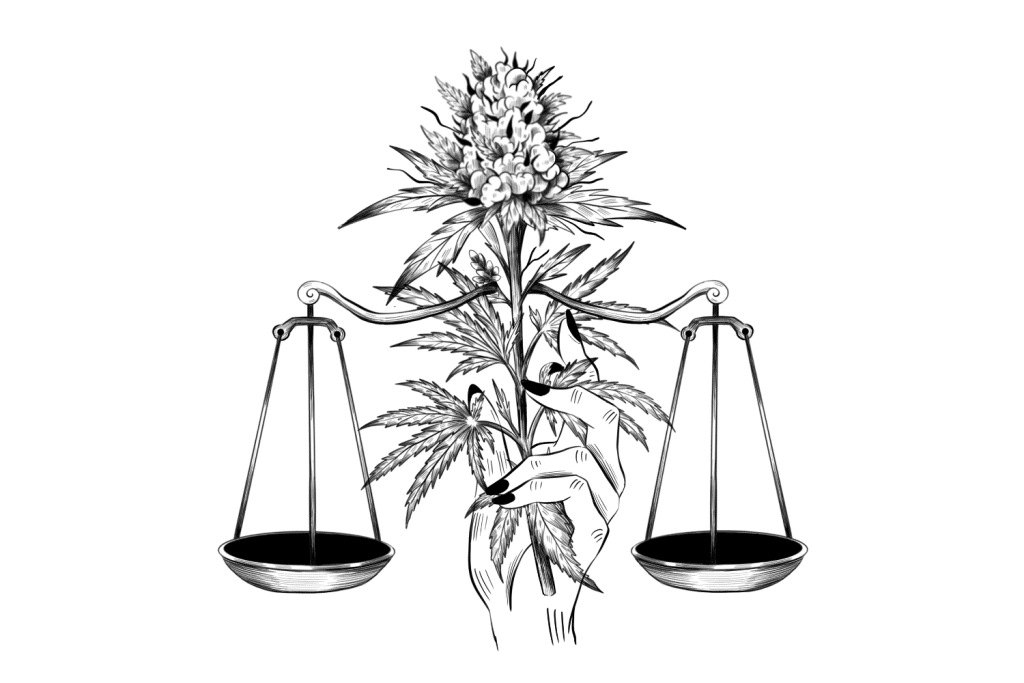
The Downside of no Regulation
Hemp companies have very little regulatory oversight, and it’s not uncommon for them to occasionally cut corners. For the most part, these decisions typically result in a lower-quality product, but it’s always possible for something worse to happen.
Within the hemp industry, the only regulatory requirement is typically to test for the concentration of delta-9 THC to prove it’s below 0.3%. With delta-8 products, this means companies don’t have to prove the claims they make on the label of their packages are even correct.
Residual solvents from the production of delta-8 or hemp-derived delta-9 THC products also don’t typically require testing. While it’s rarely a serious concern, there’s always a risk of consuming something far more toxic than cannabis.
It’s easy to see the risk this all poses for people in restrictive states who see delta-8 THC popping up in gas stations, coffee shops, and smoke shops. While the vast majority of the products are likely safe and moderately effective, there’s no way to know for sure without doing your research beforehand.
Safety & Side Effects
Delta-8 and delta-9 THC both seem to be relatively safe — though delta-8 has very little research backing that up. States with legal marijuana industries have several safeguards in place for consumers of marijuana-derived delta-9 THC products, but hemp products are a little murkier.
The hemp market that delta-8 THC and hemp-derived delta-9 THC belong to has very few requirements or responsibilities.
Side Effects of Delta-8 & Delta-9 THC
While delta-8 is considered a lighter form of THC, it still has the same potential for side effects as delta-9. It may take more delta-8 THC than delta-9 to reach unpleasant levels, but nothing is suggesting it isn’t still possible.
Some of the side effects of taking too much THC include [5]:
- Paranoia or heightened states of anxiety
- Feelings of psychosis or detachment from reality
- Alterations in perception, including auditory and visual hallucinations
- Impairment in time and distance perception
- Delayed reaction times and disconnected thoughts
- Loss of motor function and coordination
In excessive amounts, some users experience a “green out,” which is the marijuana version of blacking out on alcohol. Greening out looks different from person to person — some experience vomiting or intense nausea and paleness, and others get dizzy and disoriented before passing out.
Cannabis isn’t a dangerous drug to overdose on when it comes to physical symptoms, but it can be terrifying and weigh heavily mentally and emotionally.

Synthetic, Semi-Synthetic, & All-Natural THC
Deta-8 and delta-9 THC both form naturally in cannabis, but the former does so in minor concentrations, meaning it’s not a great source for producers. However, since they all come from the same “mother” cannabinoid — cannabigerolic acid (CBGA) — the structure of cannabidiol (CBD), THC, and cannabichromene (CBC) are all similar [3].
Delta-8 THC production involves isolating CBD and subjecting it to a series of conversions to morph it into the final product. This typically results in a decent amount of delta-9 production as well, meaning most delta-8 is made in states where weed is legal.
This leaves delta-8 THC in a murky grey area as a naturally occurring cannabinoid with mostly synthetic products. It also means that every delta-8 THC product on the market has undergone an extensive process of chemical and physical conversions to reach the shelves.
The lack of regulation in hemp creates a major area for concern, potentially opening the door for harmful contaminants to remain in the end product.
Vendors who care enough about their products to put their customer’s minds at ease will provide a third-party lab report on their offerings. This should test for residual chemicals along with the cannabinoid and terpene concentrations in a non-biased lab.
Hemp Derived D9 vs. D8
Another growing trend in restrictive states is edibles containing “hemp-derived delta-9 THC.” While these may have a stronger effect (at least in theory), it’s important to remember they still go through a long manufacturing process, just like delta-8.
Utilizing a slightly different loophole from the same legal language we’ll discuss below, these can contain 10 mg or more of delta-9 THC — often without anything else. Though the delta-9 THC concentration in hemp plants is negligible, several products involve removing residual THC to isolate CBD, and that has to go somewhere.
While there haven’t been tests on whether delta-9 THC from hemp acts differently from marijuana, the ⅔ relative potency of delta-8 likely stands regardless of where the delta-9 comes from.

Is Hemp-Derived Delta-9 THC Safer Than Delta-8?
Both options are likely to be safe in moderate doses, but delta-8 has a slightly lower potency than delta-9. This means it may be less likely to cause states of paranoia or other unpleasant side effects, though not impossible.
The big difference is in how much easier THC remediation from hemp is than converting CBD isolate into delta-8. The latter involves chemical reactions and synthetic production, which run the risk of leaving behind some potentially toxic chemicals.
On an even playing field with a hemp vendor who cares enough to provide quality products, the “best” option boils down to preference. For consumers who are looking for a lighter effect with more sedation and relaxation, delta-8 may be a better choice than the heavier-hitting delta-9.
Finding Trusted Cannabinoid Vendors
Since the government has yet to step in with meaningful hemp regulations, the onus falls on consumers to do their due diligence before purchasing. Several companies out there offer phenomenal products that prioritize creating high-quality cannabis for consumers.
Of course, several producers are taking advantage of the surge in interest, trying to get to the market before they’re ready or outright scamming customers.
Here are some quick tips for ensuring you’re working with a company that takes its products seriously:
- Website — Some people aren’t good at building websites, so it doesn’t have to blow you away, but it should look like it’s from this decade and show that they value the face their company puts forward
- Customer Support — If you can’t readily find a number, chat box, or email for customer support, steer clear
- Reviews — Read through some of the product reviews and see if anyone has written about them on Reddit or elsewhere to get a good vibe for the quality of the company
- Third-Party Lab Testing — While it isn’t required, hemp manufacturers who care about the quality of their product will take the step of sending it off to a third party for lab testing on all cannabinoids, residual solvents, terpenes, and any other contents
- Educational Content — It’s not a requirement for a company to maintain a blog or put out any additional content (though that helps), but they should write detailed product descriptions, instructions for dosing, and what customers should expect to feel.
- Reputation — There are a lot of newcomers to the field, but the safest bet is someone who’s been around for a bit and has built up a reputation for themselves already
If you put in the time and effort before pulling the trigger on a purchase, your chances of ending up with a low-quality product will significantly reduce.
Related Buyer’s Guides: Delta-9 THC Carts | Delta-8 THC Carts | Best Carts (All) | Delta-9 THC Gummies | Delta-8 THC Gummies | Best THC Gummies (All)
FAQs: Delta-8 vs. Delta-9 THC
Here are some of the questions people commonly ask when comparing delta-8 and delta-9 THC:
1. Is Delta-8 THC Natural?
Delta-8 THC, like delta-9 and several other forms of THC, forms naturally in the cannabis plant. However, it doesn’t form in large enough quantities for producers to extract in a natural form, so most of it is produced synthetically.
Cannabinoids all have a similar molecular structure, so they’re relatively easy to manipulate. This allows producers to start with an isolated form of CBD and put it through some chemical processes to convert it to large enough amounts of delta-8 THC for products.
2. Will Delta-8 Or Hemp-Derived Delta-9 THC Make Me Fail a Drug Test?
While both delta-8 and hemp-derived delta-9 THC are federally legal and available in most states, they go through a similar metabolization process in digestion. Since the main way drug tests work is by detecting these leftover “metabolites” in urine, all forms of THC are likely to show up on a drug test.
With a slightly lower potency, it’s likely delta-8 would pass through the system slightly faster but not enough to make a remarkable difference. For occasional THC consumers, try to steer clear of partaking if you are within a week of a drug test — frequent consumers may need to wait a month or longer to be in the clear.
3. Is Delta-9 THC Stronger Than Delta-8 THC?
Yes — the slightly different molecular makeup of delta-8 THC gives it roughly ⅔ of the affinity (binding potential) to the CB1 receptor as delta-8. Since it doesn’t lock onto it as strongly, it doesn’t exert as much effect, though larger doses of delta-8 will deliver a comparable effect to delta-9.
While some research indicates delta-8 can bind to the non-intoxicating CB2 receptors that CBD mainly influences, it is still uncertain if this is true. If it is, delta-8 can combat some of the negative effects of large doses of THC or provide additional anxiety-relieving effects of its own.
4. Do Companies Sell Smokable Delta-8 THC Flower?
Not exactly — delta-8 has to go through a synthetic process for production, so it’s not available in smokable flower like marijuana is. However, producers will commonly spray delta-8 onto hemp flower to create a smokable option that’s closer to a 1:1 CBD to THC ratio.
The downsides of this option include a harsher smoke, which can feel and taste unpleasant, along with the fact that it’s common to spray on low-quality hemp flower. However, a large population of consumers could benefit from a smokable option with a larger amount of CBD.
5. Is There A Way To Smoke Hemp-Derived Delta-9 THC?
The only way to produce a federally-legal, hemp-derived delta-9 THC product is to include it in an edible to offset the weight of THC. Legally, these products cannot contain more than 0.3% THC on a dry weight basis — for reference, a flower with 15% would get laughed out of most dispensaries.
Unlike delta-8 THC, producers cannot spray smokable flower with delta-9 THC as it would exceed the 0.3% weight limit of the 2018 Farm Bill. Pulling the THC from hemp is only half of the way that delta-9 THC products can be in hemp shops across the country.
Subscribe For More 🍄
References
- Delta‐8‐ and delta‐9‐tetrahydrocannabinol; Comparison in man by oral and intravenous administration—Hollister—1973—Clinical Pharmacology & Therapeutics—Wiley Online Library. (n.d.). Retrieved March 25, 2024, from https://ascpt.onlinelibrary.wiley.com/doi/10.1002/cpt1973143353
- Delta-8-THC: Delta-9-THC’s nicer younger sibling? | Journal of Cannabis Research. (n.d.). Retrieved March 25, 2024, from https://link.springer.com/article/10.1186/s42238-021-00115-8
- Leas, E. C. (2021). The Hemp Loophole: A Need to Clarify the Legality of Delta-8-THC and Other Hemp-Derived Tetrahydrocannabinol Compounds. American Journal of Public Health, 111(11), 1927–1931. https://doi.org/10.2105/AJPH.2021.306499
- Tagen, M., & Klumpers, L. E. (2022). Review of delta-8-tetrahydrocannabinol (Δ8-THC): Comparative pharmacology with Δ9-THC. British Journal of Pharmacology, 179(15), 3915–3933. https://doi.org/10.1111/bph.15865
- Carlini, E. A. (2004). The good and the bad effects of (−) trans-delta-9-tetrahydrocannabinol (Δ9-THC) on humans. Toxicon, 44(4), 461–467. https://doi.org/10.1016/j.toxicon.2004.05.009

